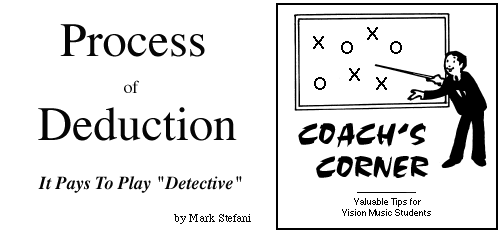
One of the most valuable assets we can possess as musicians is something that is often times overlooked. This is our potential power of deduction, a skill that can enable us to navigate the most complicated musical situations, and in the process help us attain our goals. This edition of "Coach's Corner" focuses on just how important it is to be a musical "detective" in your quest for improvement. I'll try to cite some specific examples from my own study and teaching experience that help will support this "Sherlock Holmes" contention. But before I get into that...
The first thing to reflect on is the fact that the world of music seems full of hurdles, and what often appears to be confusing and insurmountable circumstances. I find that, nine times out of ten, players just don't look hard or logically enough to find an easier way. And believe me. There's almost always an easier way!s
Two immediate areas of study spring to mind when discussing the subject of logical deduction. The first is arranging, and I'll confine these thoughts to the specific area of arranging standards and jazz/blues solos for guitar and bass. This is something that I've done on a regular basis for years, as well as coached many others along the same pathway.
Many times the difference in making something sound professional and polished, as in the case of left-hand fingerings for chords and single-line passages, or right-hand pick direction/choice of fingers, is so simple. But only after you've exhausted every conceivable possibility should you make a final decision. If there's any doubt in your mind whatsoever about the existence of an easier way, keep that "detective hat" on until you're as certain as possible! And to be honest, I'm still amazed at how often I've stumbled upon a better approach to a given situation, though it seems that every alternative has been exhausted. The bottomline is that, if you always try really hard, you'll become infinitely better at finding a superior solution, and therefore infinitely better as a player in the long run. Logical "deduction," eh?
Transcribing the recorded works of other players is a natural area for utilizing your detective skills. People often comment "what a great ear you have" when they see just how many solos and performances that I've managed to transcribe over the years, but they often fail to see that having a decent ear is only part of the equation. For instance, if you're already familiar with a specific artist or style of music, each subsequent attempt should become easier and easier to decipher. Why? Because you already have deductive factors gathered from previous attempts. You know in advance what you'd expect to occur, and when something different happens, it becomes even more exciting and fascinating. Like a new piece in your musical "jigsaw puzzle" that keeps you coming back for more and more information.
Is this all making sense to you? Perhaps the subject is too trite and obvious, but I find myself repeatedly in situations where a student will say "why didn't I think of that?" Well, sometimes in our quest to focus on acquiring phenomenal technical prowess, a keen musical intellect, and a vast repertoire of tunes and riffs, we lose sight of one of the most fundamental tools in our arsenal. It's called "common sense," and it was there to begin with!
"Coach's Corner" is an ongoing addition to Vision Music. The purpose of these brief articles is to share philosophy, offer practical insights, and to enhance your musical studies.
For the "ultimate" guitar and bass experience...